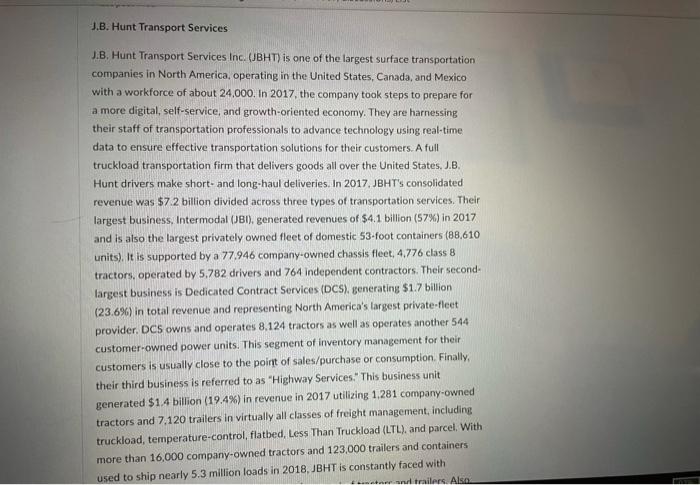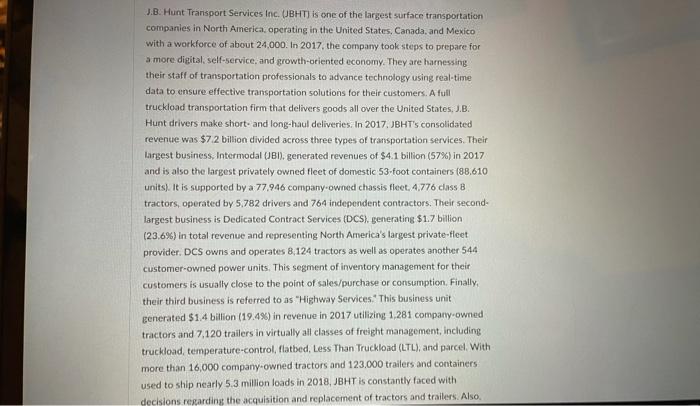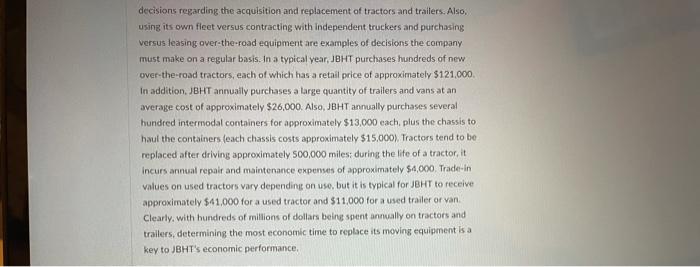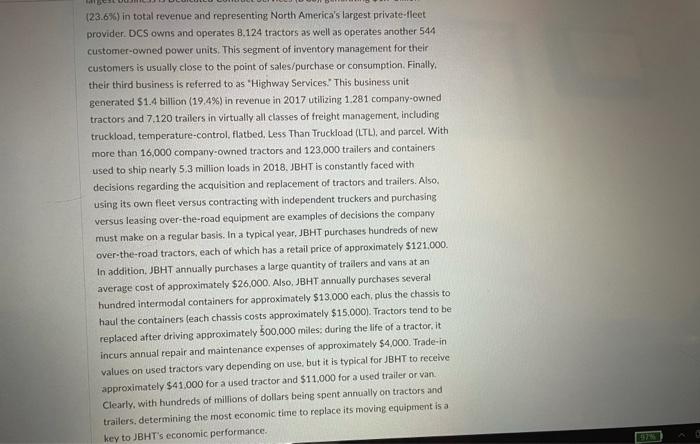this is all i was given, it is industrial econ. please help in any way you can, thanks!

J.B. Hunt Transport Services Inc. UBHT) is one of the largest surface transportation companies in North America, operating in the United States, Canada, and Mexico with a workforce of about 24,000. In 2017, the company took steps to prepare for a more digital, self-service, and growth-oriented economy. They are harnessing their staff of transportation professionals to advance technology using real-time data to ensure effective transportation solutions for their customers. A full truckload transportation firm that delivers goods all over the United States, J.B. Hunt drivers make short and long-haul deliveries. In 2017, JBHT's consolidated revenue was $72 billion divided across three types of transportation services. Their largest business Intermodal (Bl). generated revenues of $4.1 billion (57%) in 2017 and is also the largest privately owned fleet of domestic 53-foot containers (88.610 units). It is supported by a 77.946 company owned chassis fleet. 4,776 class B tractors, operated by 5.782 drivers and 764 independent contractors. Their second- largest business is Dedicated Contract Services (DCS), generating $1.7 billion (23.6%) in total revenue and representing North America's largest private-fleet provider DCS owns and operates 8,124 tractors as well as operates another 544 customer-owned power units. This segment of inventory management for their customers is usually close to the point of sales/purchase or consumption. Finally, their third business is referred to as "Highway Services. This business unit generated $1.4 billion (19.4%) in revenue in 2017 utilizing 1,281 company owned tractors and 7.120 trailers in virtually all classes of freight management, including truckload, temperature control, flatbed, Less Than Truckload (LTL), and parcel, With more than 16,000 company-owned tractors and 123,000 trailers and containers used to ship nearly 5.3 million loads in 2018, JBHT is constantly faced with decisions regarding the acquisition and replacement of tractors and trailers. Also, decisions regarding the acquisition and replacement of tractors and trailers. Also, using its own fleet versus contracting with independent truckers and purchasing versus leasing over-the-road equipment are examples of decisions the company must make on a regular basis. In a typical year, JBHT purchases hundreds of new over-the-road tractors, each of which has a retail price of approximately $121,000 In addition, JBHT annually purchases a large quantity of trailers and vans at an average cost of approximately $26,000. Also, JBHT annually purchases several hundred intermodal containers for approximately $13,000 each, plus the chassis to haul the containers (each chassis costs approximately $15.000), Tractors tend to be replaced after driving approximately 500,000 miles during the life of a tractor, it Incurs annual repair and maintenance expenses of approximately $4,000. Trade-In values on used tractors vary depending on use, but it is typical for JBHT to receive approximately $41,000 for a used tractor and $11,000 for a used trailer or van Clearly, with hundreds of millions of dollars being spent annually on tractors and trailers, determining the most economic time to replace its moving equipment is a key to JBHT's economic performance, 1. Do you suppose that JBHT makes replacement decisions for its equipment on an item-by-item level or for a fleet of equipment? 2. What might be some of the advantages and disadvantages to replacement at the fleet level? 3. What factors might influence the useful life of the JBHT equipment? 4. Why use miles instead of years (time) as a parameter for replacement? How might safety factor into the replacement analysis decision? J.B. Hunt Transport Services J.B. Hunt Transport Services Inc. (BHT) is one of the largest surface transportation companies in North America, operating in the United States, Canada, and Mexico with a workforce of about 24,000. In 2017, the company took steps to prepare for a more digital, self-service, and growth-oriented economy. They are harnessing their staff of transportation professionals to advance technology using real-time data to ensure effective transportation solutions for their customers. A full truckload transportation firm that delivers goods all over the United States, J.B. Hunt drivers make short and long-haul deliveries. In 2017. JBHT's consolidated revenue was $7.2 billion divided across three types of transportation services. Their largest business, Intermodal (BI), generated revenues of $4.1 billion (57%) in 2017 and is also the largest privately owned fleet of domestic 53-foot containers (88,610 units). It is supported by a 77.946 company-owned chassis fleet, 4.776 class 8 tractors, operated by 5.782 drivers and 764 Independent contractors. Their second- largest business is Dedicated Contract Services (DCS), generating $1.7 billion (23.6%) in total revenue and representing North America's largest private fleet provider. DCS owns and operates 8,124 tractors as well as operates another 544 customer-owned power units. This segment of inventory management for their customers is usually close to the point of sales/purchase or consumption. Finally, their third business is referred to as "Highway Services." This business unit generated $1.4 billion (19.4%) in revenue in 2017 utilizing 1.281 company-owned tractors and 7.120 trailers in virtually all classes of freight management, including truckload, temperature-control, flatbed, Less Than Truckload (LTL) and parcel. With more than 16,000 company-owned tractors and 123,000 trailers and containers used to ship nearly 5.3 million loads in 2018.JBHT is constantly faced with nel trailers. Also (23.6%) in total revenue and representing North America's largest private-fleet provider. DCS owns and operates 8.124 tractors as well as operates another 544 customer-owned power units. This segment of inventory management for their customers is usually close to the point of sales/purchase or consumption. Finally, their third business is referred to as "Highway Services. This business unit generated $1.4 billion (19.4%) in revenue in 2017 utilizing 1.281 company-owned tractors and 7.120 trailers in virtually all classes of freight management, including truckload, temperature-control, flatbed, Less Than Truckload (LTL), and parcel, With more than 16,000 company-owned tractors and 123,000 trailers and containers used to ship nearly 5.3 million loads in 2018. JBHT is constantly faced with decisions regarding the acquisition and replacement of tractors and trailers. Also, using its own fleet versus contracting with independent truckers and purchasing versus leasing over-the-road equipment are examples of decisions the company must make on a regular basis. In a typical year, JBHT purchases hundreds of new over-the-road tractors, each of which has a retail price of approximately $121.000. In addition, JBHT annually purchases a large quantity of trailers and vans at an average cost of approximately $26,000. Also, JBHT annually purchases several hundred intermodal containers for approximately $13.000 each, plus the chassis to haul the containers (each chassis costs approximately $15,000). Tractors tend to be replaced after driving approximately 500,000 miles: during the life of a tractor, it incurs annual repair and maintenance expenses of approximately $4,000. Trade-in values on used tractors vary depending on use, but it is typical for JBHT to receive approximately $41,000 for a used tractor and $11,000 for a used trailer or van Clearly, with hundreds of millions of dollars being spent annually on tractors and trailers, determining the most economic time to replace its moving equipment is a key to JBHT's economic performance. J.B. Hunt Transport Services Inc. UBHT) is one of the largest surface transportation companies in North America, operating in the United States, Canada, and Mexico with a workforce of about 24,000. In 2017, the company took steps to prepare for a more digital, self-service, and growth-oriented economy. They are harnessing their staff of transportation professionals to advance technology using real-time data to ensure effective transportation solutions for their customers. A full truckload transportation firm that delivers goods all over the United States, J.B. Hunt drivers make short and long-haul deliveries. In 2017, JBHT's consolidated revenue was $72 billion divided across three types of transportation services. Their largest business Intermodal (Bl). generated revenues of $4.1 billion (57%) in 2017 and is also the largest privately owned fleet of domestic 53-foot containers (88.610 units). It is supported by a 77.946 company owned chassis fleet. 4,776 class B tractors, operated by 5.782 drivers and 764 independent contractors. Their second- largest business is Dedicated Contract Services (DCS), generating $1.7 billion (23.6%) in total revenue and representing North America's largest private-fleet provider DCS owns and operates 8,124 tractors as well as operates another 544 customer-owned power units. This segment of inventory management for their customers is usually close to the point of sales/purchase or consumption. Finally, their third business is referred to as "Highway Services. This business unit generated $1.4 billion (19.4%) in revenue in 2017 utilizing 1,281 company owned tractors and 7.120 trailers in virtually all classes of freight management, including truckload, temperature control, flatbed, Less Than Truckload (LTL), and parcel, With more than 16,000 company-owned tractors and 123,000 trailers and containers used to ship nearly 5.3 million loads in 2018, JBHT is constantly faced with decisions regarding the acquisition and replacement of tractors and trailers. Also, decisions regarding the acquisition and replacement of tractors and trailers. Also, using its own fleet versus contracting with independent truckers and purchasing versus leasing over-the-road equipment are examples of decisions the company must make on a regular basis. In a typical year, JBHT purchases hundreds of new over-the-road tractors, each of which has a retail price of approximately $121,000 In addition, JBHT annually purchases a large quantity of trailers and vans at an average cost of approximately $26,000. Also, JBHT annually purchases several hundred intermodal containers for approximately $13,000 each, plus the chassis to haul the containers (each chassis costs approximately $15.000), Tractors tend to be replaced after driving approximately 500,000 miles during the life of a tractor, it Incurs annual repair and maintenance expenses of approximately $4,000. Trade-In values on used tractors vary depending on use, but it is typical for JBHT to receive approximately $41,000 for a used tractor and $11,000 for a used trailer or van Clearly, with hundreds of millions of dollars being spent annually on tractors and trailers, determining the most economic time to replace its moving equipment is a key to JBHT's economic performance, 1. Do you suppose that JBHT makes replacement decisions for its equipment on an item-by-item level or for a fleet of equipment? 2. What might be some of the advantages and disadvantages to replacement at the fleet level? 3. What factors might influence the useful life of the JBHT equipment? 4. Why use miles instead of years (time) as a parameter for replacement? How might safety factor into the replacement analysis decision? J.B. Hunt Transport Services J.B. Hunt Transport Services Inc. (BHT) is one of the largest surface transportation companies in North America, operating in the United States, Canada, and Mexico with a workforce of about 24,000. In 2017, the company took steps to prepare for a more digital, self-service, and growth-oriented economy. They are harnessing their staff of transportation professionals to advance technology using real-time data to ensure effective transportation solutions for their customers. A full truckload transportation firm that delivers goods all over the United States, J.B. Hunt drivers make short and long-haul deliveries. In 2017. JBHT's consolidated revenue was $7.2 billion divided across three types of transportation services. Their largest business, Intermodal (BI), generated revenues of $4.1 billion (57%) in 2017 and is also the largest privately owned fleet of domestic 53-foot containers (88,610 units). It is supported by a 77.946 company-owned chassis fleet, 4.776 class 8 tractors, operated by 5.782 drivers and 764 Independent contractors. Their second- largest business is Dedicated Contract Services (DCS), generating $1.7 billion (23.6%) in total revenue and representing North America's largest private fleet provider. DCS owns and operates 8,124 tractors as well as operates another 544 customer-owned power units. This segment of inventory management for their customers is usually close to the point of sales/purchase or consumption. Finally, their third business is referred to as "Highway Services." This business unit generated $1.4 billion (19.4%) in revenue in 2017 utilizing 1.281 company-owned tractors and 7.120 trailers in virtually all classes of freight management, including truckload, temperature-control, flatbed, Less Than Truckload (LTL) and parcel. With more than 16,000 company-owned tractors and 123,000 trailers and containers used to ship nearly 5.3 million loads in 2018.JBHT is constantly faced with nel trailers. Also (23.6%) in total revenue and representing North America's largest private-fleet provider. DCS owns and operates 8.124 tractors as well as operates another 544 customer-owned power units. This segment of inventory management for their customers is usually close to the point of sales/purchase or consumption. Finally, their third business is referred to as "Highway Services. This business unit generated $1.4 billion (19.4%) in revenue in 2017 utilizing 1.281 company-owned tractors and 7.120 trailers in virtually all classes of freight management, including truckload, temperature-control, flatbed, Less Than Truckload (LTL), and parcel, With more than 16,000 company-owned tractors and 123,000 trailers and containers used to ship nearly 5.3 million loads in 2018. JBHT is constantly faced with decisions regarding the acquisition and replacement of tractors and trailers. Also, using its own fleet versus contracting with independent truckers and purchasing versus leasing over-the-road equipment are examples of decisions the company must make on a regular basis. In a typical year, JBHT purchases hundreds of new over-the-road tractors, each of which has a retail price of approximately $121.000. In addition, JBHT annually purchases a large quantity of trailers and vans at an average cost of approximately $26,000. Also, JBHT annually purchases several hundred intermodal containers for approximately $13.000 each, plus the chassis to haul the containers (each chassis costs approximately $15,000). Tractors tend to be replaced after driving approximately 500,000 miles: during the life of a tractor, it incurs annual repair and maintenance expenses of approximately $4,000. Trade-in values on used tractors vary depending on use, but it is typical for JBHT to receive approximately $41,000 for a used tractor and $11,000 for a used trailer or van Clearly, with hundreds of millions of dollars being spent annually on tractors and trailers, determining the most economic time to replace its moving equipment is a key to JBHT's economic performance












